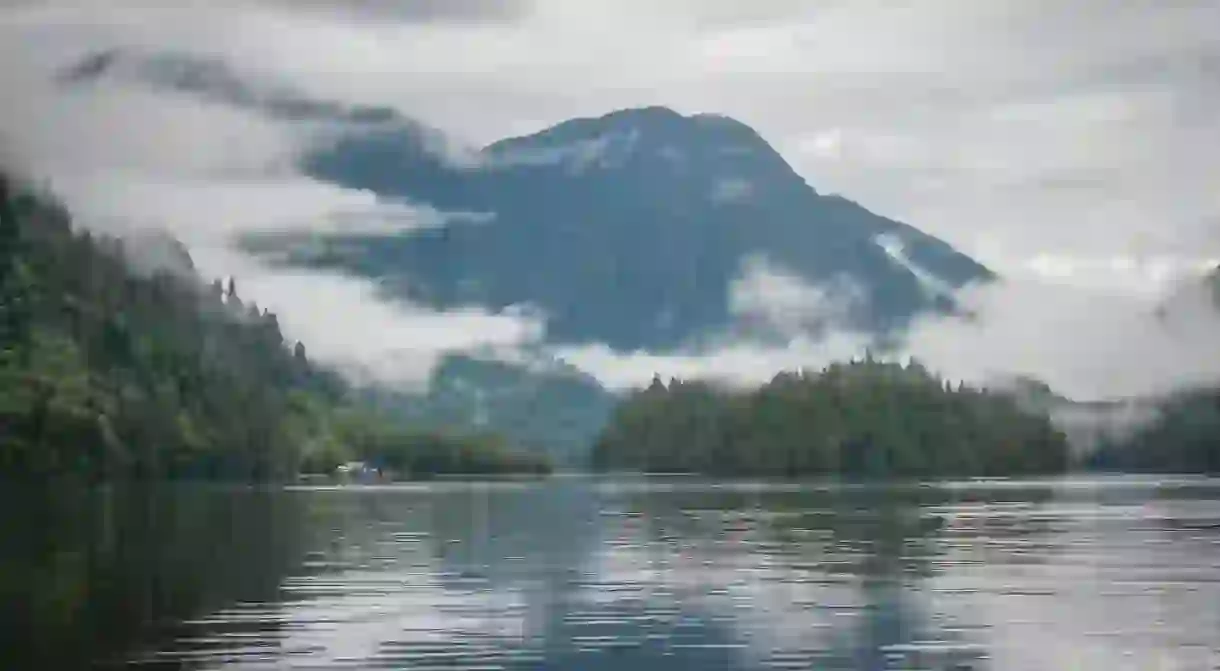Why You Should Explore Canada’s Great Bear Rainforest

Sometimes referred to as the “Amazon of the North,” the Great Bear Rainforest is a special place in British Columbia. It stretches along the coast for over 400 kilometers (249 miles), and National Geographic named it one of its best trips in 2013. Keep reading to discover why you should explore the Great Bear Rainforest now.
The Kermode (spirit) bear

The Kermode, or spirit bear, is the reason people visit the Great Bear Rainforest, as it’s the only place in the world where you can see one. The rare animal is a subspecies of the black bear. There are approximately 400 Kermode bears in the wild, but only one in 10 have the gene that gives them their creamy coat. Summer is the prime time to spot it in its natural habitat, as this is when they feed on the salmon running through the rivers. The best way to see one is via a guided tour with a local expert.
Record-holding rainforest
Yes, the Great Bear Rainforest is one of the world’s most impressive rainforests. At roughly 32,000 square kilometers (12,000 square miles), it is also the world’s largest intact temperate rainforest. Within the rainforest, expect to see old Sitka spruce trees, Pacific silver fir, and ancient cedar trees. These can reach 100 meters (328 feet) tall and have been standing in the rainforest for up to 1,500 years.
Unbeatable hikes

During the summertime, hiking through the Bella Coola Valley is a great way to see the impressive rainforest. Fortunately, there are hiking tours available, and since the area is so remote, it’s recommended that you join a tour group. Outpost Magazine suggests hiking in Snootli Creek Regional Park, which has four paths, as well as Saloompt Forest Trail and Medby Rock Lookout Trail. The latter offers the best views overlooking Bella Coola Valley. For adventurers, there’s also the option of heli-hiking (and skiing in the winter) with Tweedsmuir Park Lodge.
Outdoor adventure activities
Although it’s a remote destination, there are plenty of outdoor adventure activities to enjoy in the Great Bear Rainforest. Local operators do tours that include whale-watching, as this coastline is one of the best places in the world to spot orcas. There’s also the chance to go boating and sailing on the ocean, or kayaking and rafting down the Atnarko River. Finally, there are sports fishing charters that operate around the Great Bear Rainforest too. For more information, check out the website, which lists tour operators depending on activity.
The other wildlife

Although the spirit bear is the Great Bear Rainforest’s most celebrated resident, there are many other animals to see in this coastal wilderness. Marine life includes humpback whales, dolphins, orcas, sea lions, sea otters, and salmon. Various world-class Pacific salmon species swim in the rivers from April to October, which is when other wildlife emerge to feed on them. Other animals in the area of the Great Bear Rainforest include grizzly and black bears, Sitka deer, mountain goats, cougars, elk, and coastal gray wolves.
The region’s First Nations history
The region is home to several First Nations villages. Many totem poles and traditional artworks are visible around the Bella Coola Valley, a smaller community in the Great Bear Rainforest. Also, Lonely Planet mentions that according to First Nations legend, the raven turned the spirit bear white to show people the earth’s purity during the ice age. The Kitasoo/Xai’xais First Nations own and operate the ecotouristic Spirit Bear Lodge, which lies in the First Nations village of Klemtu. From the lodge, local First Nations guide visitors on wildlife-watching and native cultural tours. Visit the Great Bear Rainforest and learn about the region’s rich First Nations history.
The landscape

The Great Bear Rainforest’s scenery and landscape are incredible. It doesn’t just include temperate rainforest. It is also home to glacier-cut fjords, towering granite cliffs, the Coast Mountains, winding glacier-fed rivers and estuaries, and remote islands. The rainforest has remained untouched for thousands of years, which means it’s as raw and as beautiful as any landscape in the world can be. As Destination British Columbia notes, “Ocean and land are bound together in a dynamic convergence of nature that has been called ‘the last magnificent stand of the great North American rainforest’.”
Accommodation that’s more than a place to stay
Because the area is very remote, a lot of places are only accessible via floatplane or boat. Therefore, the few accommodation options around the Great Bear Rainforest offer a lot more than simply a place to rest your head. Tweedsmuir Park Lodge offers seasonal grizzly bear-viewing trips down the Atnarko River. Meanwhile, the only way to get to King Pacific Lodge is by seaplane, but all gourmet meals, guided tours, and transportation is included. As mentioned, the First Nations-run Spirit Bear Lodge does wildlife and cultural tours too.
Off the grid
As you’ve probably gathered, the Great Bear Rainforest is a very remote destination in British Columbia. It’s the perfect place to visit if you want to go off the grid in Canada. The tranquility of the rainforest is unrivaled, but visitors can also participate in as many adventures as they like. Destination British Columbia says the Great Bear Rainforest is for people seeking to connect with nature and who want to experience a cultural, spiritual, and sensory journey.













